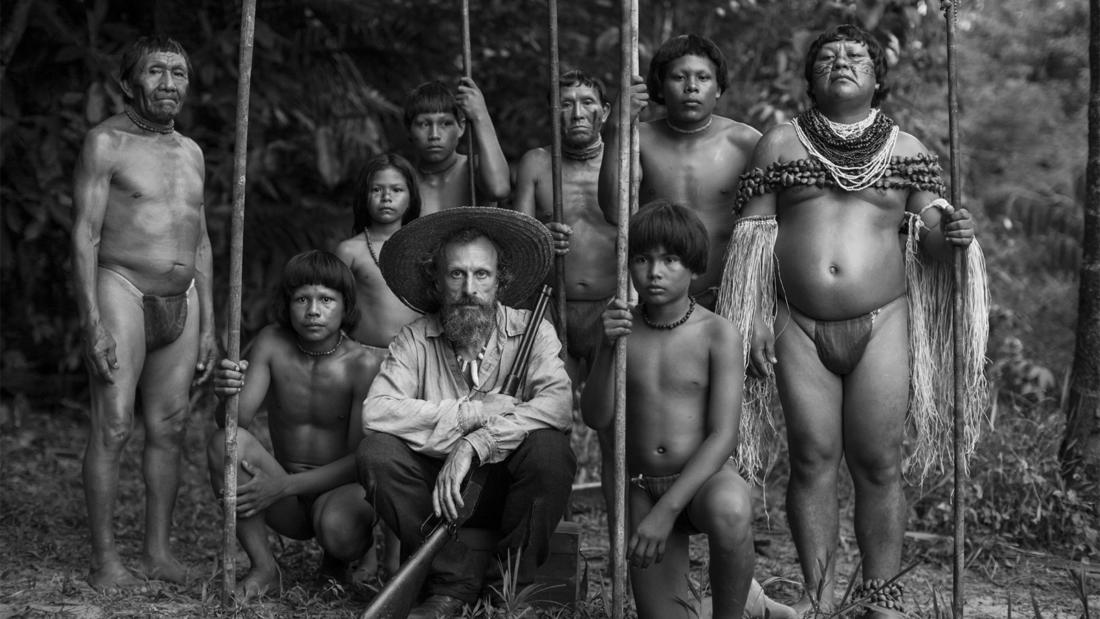
Athens Ciné Athens, GA
Dr. Pilar Chamorro Fernández
Assistant Professor of Linguistics, University of Georgia
andDr. Lina X. Aguirre
PhD in Latin American Cultural Studies, Ohio State University
andDr. Julie Velásquez Runk
Professor of Ecological & Environmental Anthropology, University of Georgia
Embrace of the Serpent— What happens when a culture is lost?
Program Description
A discussion of what happens when languages are lost, as well as the subject of 'lasts' and the loss of culture.
Presented At
Athens Ciné Athens, GA
Film Synopsis
The story of the relationship between Karamakate, an Amazonian shaman and last survivor of his people, and two scientists who work together over the course of 40 years to search the Amazon for a sacred healing plant.
The film tells two stories, taking place in 1909 and 1940, both starring Karamakate (played as a young man by Nilbio Torres and as an older man by Antonio Bolivar) an Amazonian shaman and last survivor of his tribe. He travels with two scientists, German Theodor Koch-Grunberg (Jan Bijvoet) and American Richard Evans Schultes (Brionne Davis), to look for the rare yakruna, a sacred plant. The film is loosely inspired by the diaries written by the two scientists during their field work in the Amazon. Embrace of the Serpent won the Art Cinema Award in the Directors' Fortnight section at the 2015 Cannes Film Festival, and it was nominated for the Best Foreign Language Film at the 88th Academy Awards.
About the Speaker
Dr. Pilar Chamorro Fernández is an assistant professor of linguistics at the University of Georgia. She attended Ohio State University, where she completed her dissertation entitled “Pluractionality and Aspectual Structure in the Galician Spanish Tener-perfect.” Dr. Chamorro’s research deals with temporal reference and the truth-conditional and pragmatic contribution of temporal, aspectual, and modal expressions across languages. She is also interested in the semantics of plurals. More specifically, her work explores the expression of event plurality in periphrastic constructions in Galician, Portuguese, and the Spanish spoken in Galicia. She examines their relation with verbal pluractionals and similar quantificational expressions cross-linguistically.
Dr. Lina X. Aguirre studied economics at the Colegio Mayor de Nuestra Señora del Rosario in Bogota, Colombia, where she obtained her BA in 1997. In 2007, she received her MA in literature from the Xaverian University in Bogota and recently finished her doctoral studies in Latin American literature and culture at Ohio State University. Her research focuses on contemporary Latin American poetry and visual cultures. Her doctoral dissertation examined the manifestations of precarity in the artistic practices of young poets and visual artists from Chile. Particularly, she focused on how globalization and the neo-liberal economic regime produce specific types of precarity and how this precarity takes form in poetry, video, painting, and multimedia art.
Dr. Julie Velásquez Runk is a professor of ecological and environmental anthropology at the University of Georgia. Her research uses integrative (or interdisciplinary) approaches to how people use and manage their landscapes, how that relates to science, conservation, indigenous knowledge, and policy, and how people cope with variability and change. She grounds this work in political ecology, science and technology studies, and collaboration. Her investigations contribute to three key areas of understanding for human-environment relations and cultural anthropology: 1) how to conserve and govern environments in culturally sensitive ways; 2) how indigenous populations maintain their identity and advocate for their rights in spite of tremendous change; 3) and how to make science more collaborative, via processes that build theory and incorporate multiple voices.